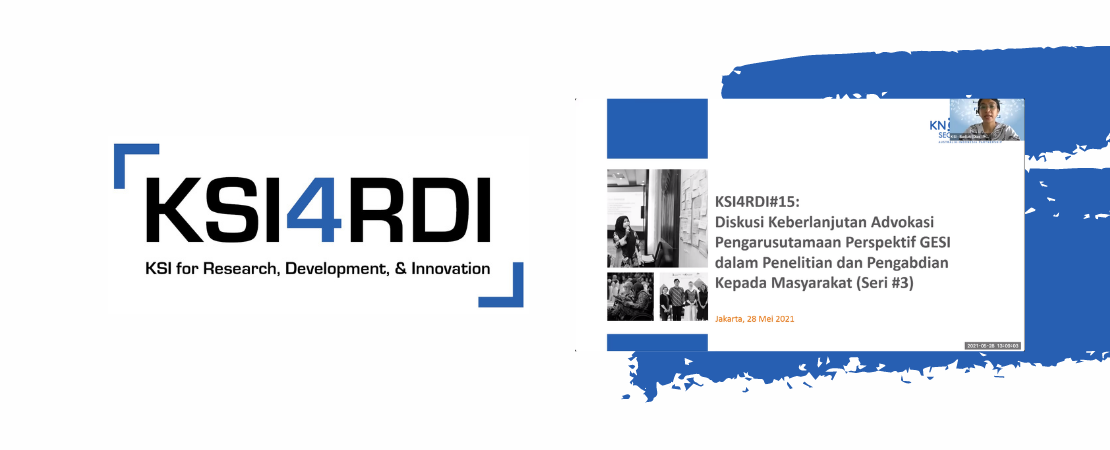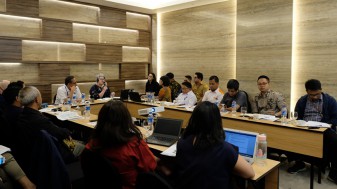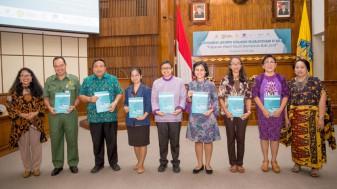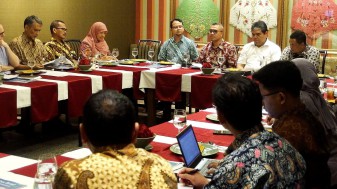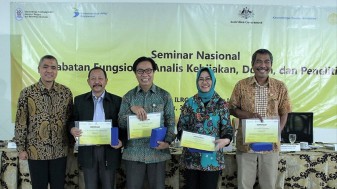Policies concerning mainstreaming the perspective of gender equality, disability, and social inclusion or GEDSI into research and community service in Indonesia have not been optimally applied. Hence, institutional strengthening is necessary to ensure these policies are being implemented appropriately.
This was one of the discussion points in the Knowledge Sector Initiative for Research, Development and Innovation event, or KSI4RDI#15, themed “Discussion on the Sustainability of Advocating to Mainstream GEDSI Perspective into Research and Community Service (Series #3)”. This online discussion held on Friday (28/5) was attended by representatives from a number of organisations, including the Indonesian Association of Women/Gender & Child Studies (ASWGI), Indonesian Young Academy of Science (ALMI), Australia-Indonesia Disability Research and Advocacy Network (AIDRAN), Cakra Wikara Indonesia (CWI), Indonesian Institute of Sciences (LIPI), and the Center for Indonesian Law and Policy Study (PSHK) Indonesia and Indonesian Law Academic Institution Jentera (Sekolah Tinggi Hukum Indonesia Jentera). This event was held and directly facilitated by Knowledge Sector Initiative (KSI).
According to Budiati Prasetiamartati as one of KSI’s Program Lead, the series of discussion that has entered its third series aims to identify and develop advocacy strategy that stakeholders want to deliver in order to promote the implementation of GEDSI perspective in research and community service. “So what we can do together in a short time, until December 2021,” she said.
Continuing on that, the Deputy Head of ASWGI, Keppi Sukesi, said that the remaining time, until the end of December 2021, is quite short to promote a sustainable policy change on GEDSI perspective. For that, there needs to be mapping on long term and short term policies that we intend to change. In doing so, mapping policymaking actors is also crucial so that they can be informed since the beginning regarding this forum’s efforts.
With regards to the research grant in the Directorate of Research and Community Service (DRPM), the GEDSI guideline actually already exists. However, research proposal examiners are not sensitive to GEDSI perspective, thus not approving many GEDSI-themed researches. Ina Hunga from ASWGI conveyed that this has become one issue that needs to be addressed. Therefore, she suggested an institutional strengthening focusing on GEDSI issues at universities and other levels to ensure the implementation of research grant guideline using GEDSI perspective, particularly by DRPM. “This GEDSI institutional aspect has layers, at universities, then at a higher level, also in DRPM, all of these made its supervision possible,” she said.
The Head of ASWGI, Emy Susanti, agreed with this. Institutional strengthening, starting from gender and disability study centres at universities to the DPRM level, needs to be done. At the university level, for example, efforts to eradicate sexual violence require a task force focusing on overseeing the process. This can also be applied to promote GEDSI implementation in research and community service.
Technical guideline
Considering that GEDSI-related regulations and policies already exist, the President of AIDRAN, Dina Afrianty, said that we also have to communicate with relevant parties. For this, there needs to be activities that engage universities as institutions to ensure they understand the diversity of disabilities and its fulfilment. The output from these types of activities can be a mechanism to implement regulations or policies. Based on AIDRAN’s experience, these kinds of mechanisms are often absent. “The mechanism on how to give access, how a researcher can conduct researches on disabilities,” she said.
Similarly, CWI Researcher, Dewi Mulyani Setiawan, expressed that on campus, GEDSI perspective is integrated in the research course. However, the practice is less than optimal because it still depends on the lecturer presiding over the course. Therefore, the presence of a guiding mechanism to conduct GEDSI research that can be accessed by students is vital. “Despite already being taught, it is not well implemented due to the absence of a clear guideline on how to apply it in researches. So students cannot apply it optimally, even when they know they have to apply it eventually when they graduate,” she explained.
In response to this, LIPI Researcher, Wati Hermawati, proposed that a change in the policy technical guideline becomes a recommendation of this forum. This is more relevant considering that technical guideline is closely related to policy. When we want to propose policy recommendation, the points of the recommendation must be clear. Regarding grant fund management, for instance, it is also necessary to develop guidelines on its research and reporting n addition to the need for recommendation on grant funding guideline. All of these need to be incorporated in the technical guideline that must be understood by relevant parties, including researches, research coordinators, and grant fund managers. “GEDSI must not only be understood by grantees, but also the grant fund managers. So it has to be traceable. If we want to have a comprehensive change, it cannot happen on just one side or one party,” she said.
This third series meeting successfully formulated the achievements, outputs, activities, and names or representing organisations serving as contacts in overseeing the development of the recommendation document. The agreed shared outcome was institutional strengthening on grant guideline of the Directorate of Research and Community Service (DPRM) using GEDSI perspective. Three outputs were derived from the output above, namely: (i) producing policy recommendation/policy brief to be presented to DRPM; (ii) holding a series of meetings to advocate this policy recommendation to DRPM, Ministry of Education, Culture, Research and Technology, National Research and Innovation Agency (BRIN), Indonesian Institute of Sciences (LIPI), Indonesia Endowment Fund for Education (LPDP), Ministry of Religious Affairs, Ministry of Women Empowerment and Child Protection, and other relevant stakeholders; (iii) established coalition for mutual actions to promote increasing number of GEDSI perspective proposals coming in and are funded by DRPM. The next process is the KSI Team will contact each of the organisation to begin implementing this strategy and follow-up plants in the policy development process.
KSI4RDI (KSI for Research, Development and Innovation) is an interactive discussion initiated by KSI, a partnership between the Government of Indonesia and Australia, funded by the Department of Foreign Affairs and Trade (DFAT) Australia. The KSI4RDI discussions are held regularly, and aims to support the increasing use of evidence in the policymaking process, which will directly encourage policymakers to produce more inclusive and effective policies.

